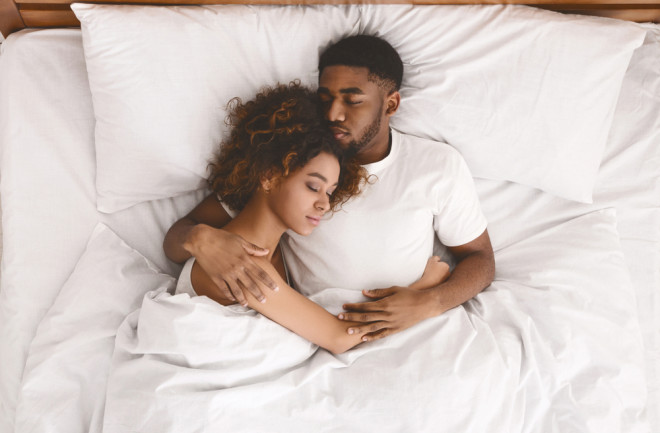Most adults require between seven and nine hours of sleep per night. Sleep needs decrease with age, starting with 14-17 hours at birth and decreasing to around seven to eight hours after age 65. But in addition to age, research also shows that there are differences in the sleep requirements of men versus women, with women requiring more sleep.
According to neurologist and sleep medicine physician Jeffrey Durmer, women tend to sleep longer than men, go to sleep earlier, and experience more deep sleep. The deepest stage of sleep is the third stage of NREM — most people spend about a quarter of the night in this stage, a time when the brain slows and the body repairs itself. While we may know that women tend to need more sleep than men, we’re still not entirely sure why.
Read More: The Strange Sleeping Habits of Homo Sapiens
Why Do Women Need More Sleep Than Men?
A wide breadth of research has shown that across most life stages, women slept more than men, though the differences in the gender gap were relatively small. On average, women needed around 6 to 28 more minutes of sleep per night than men.
For researchers, understanding why women need more sleep is still the million-dollar question. Sex hormones may impact the sleep/wake cycles, says Durmer. Estrogen and other hormones that women produce in higher quantities compared to men might also play a role. We just don’t know for sure.
It should also be noted that it’s an overgeneralization to say that all women require more sleep than men because while some women certainly do, other women have shorter sleep requirements.
Read More: Why Do We Sleep?
Other Sleep Differences in Men vs. Women
A number of other sleep differences are also common across the genders. “Sleep latency, or the amount of time it takes to fall asleep, is also longer in women,” says Durmer.
Women are more likely to have insomnia and less likely to have sleep apnea. They’re also much more likely to have restless leg syndrome (RLS), which can keep them from getting enough rest.
A January 2020 study published in the International Journal of Environmental Research and Public Health found that women may be more likely to get RLS because it’s a common issue during pregnancy. It’s also common in those with an iron deficiency, which women are more likely to have.
“Both iron (at relatively low levels in women) and estrogen (at relatively high oscillating levels in women) influence dopamine and glutamate transmission, which may help to explain women's vulnerability to this condition,” wrote the study authors. Depression and anxiety may also play a role in RLS.
Read More: Everything You Need to Know About Iron Supplements
Why Are Women More Likely To Have Insomnia?
Durmer says that insomnia in women is perpetuated by a host of issues. “Women have more insomnia because they have more anxiety than men,” says Durmer.
Women also have a host of stressors across their lifespans that can cause insomnia. For example, they tend to play a larger role in the caretaking of children and their elderly parents. Pregnancy can also impact sleep, and oftentimes, it’s difficult to recover from the damage done.
“Often pregnancy stimulates insomnia or another sleeping problem, but it continues long after,” says Durmer.
A study published in the April 2019 issue of the journal Sleep found that it takes six years for parents to recover from the sleep deprivation caused by a newborn. “Sleep satisfaction and duration sharply declined with childbirth and reached a [peak] during the first three months postpartum, with women more strongly affected,” wrote the study authors.
Hormonal issues associated with menopause can also play a role. Almost half of women say that sleep issues arose with menopause, which can be caused by reduced estrogen and the symptoms associated with it, like hot flashes.
Read More: 5 Ways to Fall Asleep Faster, According to Science
How To Get Better Sleep
The bottom line is that while women might require more sleep than men, they don’t often get it. Only about a quarter of women report that they get enough high-quality sleep most nights.
Durmer says that if you want to sleep well, prioritize it. That means reading before bed instead of watching television or scrolling through your phone. Read outside of the bedroom until you start to feel sleepy, and then make your way to bed. Don’t drink before bed or eat a heavy meal. And don’t go to bed before you’re ready to snooze.
“Your bedroom should be a sanctuary for sleep and sex, and that’s all,” says Durmer.
Read More: 6 Ways To Wake Up Feeling More Rested
Article Sources
Our writers at Discovermagazine.com use peer-reviewed studies and high-quality sources for our articles and our editors review them for accuracy and trustworthiness. Review the sources used below for this article:
The Centers for Disease Control and Prevention. How Much Sleep Do I Need?
American Sociological Review. Gender and Time for Sleep among U.S. Adults
Journal of community hospital internal medicine perspectives. How to interpret the results of a sleep study
International Journal of Environmental Research and Public Health. Why Are Women Prone to Restless Legs Syndrome?
Read More: Noise Colors: Which One Is Best for Sleep?

